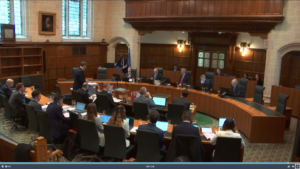Bishop & Sewell in the Supreme Court
A1 Properties (Sunderland) Ltd v Tudor Studios RTM Company Ltd
It is not every day that a case goes to the Supreme Court. We have been acting on behalf of ALEP, the Association of Leasehold Enfranchisement Practitioners on a pro bono basis and we sought permission to intervene in the Supreme Court case of A1 Properties (Sunderland) Limited v Tudor Studios RTM Limited (‘Tudor Studios’).
Our application to intervene was on the basis that ALEP, as a public body, would have argument and assistance to give to the Court as an ‘amicus curiae’ in the development of what may well be a new strand of case law in this area.
The case of Tudor Studios is an RTMmatter and concerns issues relating to the service of notices, particularly the question of whether an intermediate landlord needs to be served with a copy of the RTM claim notice. The Tudor Studios matter followed the decision of the Court of Appeal in Elim Court RTM Co Ltd v Avon Freeholds Ltd [2017] EWCA Civ 89 (‘Elim Court’).
The Court of Appeal held in Elim Court that a failure to serve a single intermediate landlord with an overriding lease and no management functions did not invalidate the notice of claim. In Tudor Studios, matters went further as there were a significant number of intermediate landlords – 237 in total – all overriding leaseholders being individual investors in student accommodation in Leicester. Once again, they had no management function but were not served, potentially deliberately so, following the position in Elim Court.
However, this case has the potential to have broader impact than just in the narrow field of RTM, and indeed enfranchisement where there is a ‘read across’ in the case law as many of the 1993 Act and 2002 Act provisions mirror each other. From a jurisprudential point of view, the case is even more interesting as it raises the question, which has been addressed in many public and private law cases over the years, of what happens when Parliament prescribes a procedure under a statute, and this is then not followed.
The leading case on this is R v Soneji and another [2005] UKHL 49 (‘Soneji’), a criminal case from 2005, and a judgment of the House of Lords (as the Supreme Court then was).
The question for the Courts has always been what Parliament may have intended the consequences of the particular non-compliance to have been.
This raises a number of issues, including in the particular case what should happen when the intermediate landlord is not served, and quite possibly deliberately so. Judge Elizabeth Cooke in the Upper Tribunal said that it was wrong to impute that Parliament would automatically have objected to this ‘deliberate’ non-service:
- “I fail to see that that is right, and indeed it feels like an illegitimate anthropomorphising of Parliament by attributing to it indignation at a deliberate default. “
When we look more widely to our common law cousins in Australia and New Zealand, they have also grappled with these questions but have resolved them, in general, by applying the sort of test set out in Soneji, i.e. to look at what the likely prejudice to either party would be as a result of the non-compliance in question; and then to assess the question of validity in the light of this. This is because our Parliament (and Parliaments generally) are assumed to make laws that are ‘fair’ – or intended to be so – and also that the requirements and burden for compliance with them in the exercise of intended rights should be ‘reasonable’ wherever possible.
In this case, as the interveners, we took neither party’s side although the ALEP’s position was to seek to promote clarity and as such, draw the Court’s attention to the possibility that the existing body of case law and in particular, not only Elim, but also the decision in Natt v Osman [2014] EWCA Civ 1520, which may well need to be looked at again.
Natt introduces what might be seen as an artificial distinction between two categories of errors in procedures and, in the case of property rights particularly, brings about a harsher distinction than might be seen in the context of a wider Soneji style test.
The test in Natt makes the distinction between cases where the decision of a public body is challenged involving an administrative or public law requirement and those where the statute confers a property or similar right. In the second category of cases, the courts following Natt have sought to interpret the notice itself to see whether it actually complies with the strict requirements of the statute. If it does not, then the notice has been held to be invalid.
The truth is, however, that there is often a degree of blurring between the two as cases such as Elim Court show where precise and ‘mandatory’ requirements of statutes are interpreted so that the failure to comply is excused where Parliament is deemed not to have intended strict compliance.
As interveners, we therefore sought to suggest to the Supreme Court that it could consider exercising its power to rule that Natt v Osman was wrongly decided and to move the case law in this area forward by adopting a test that is more based on substantive prejudice to the parties when seeking to ascertain Parliament’s intention.

If the Court decides to move in this way, this would simplify the applicable test and arguably provide greater certainty in many cases. Failures to comply with the provisions of statutory procedure would be seen in the widest context, meaning that the scope for litigation around validity may potentially be reduced, and certainly in cases where the Courts must decide this, the test that is to be applied is commensurate with that in both public and private law.
As Intervener we can neither win nor lose – as we are not a party. However, our client’s purpose in this intervention was to seek clarification and rewriting of the law in this area, something that we hope will be achieved. I would hope that our arguments were of assistance to the Court and that the wider authority and argument put forward may be of use to the Lord Justices when making their decision.
We await the Supreme Court’s decision in a few months’ time.
Mark Chick commented as follows:
“I would particularly like to thank Philip Rainey KC and Mark Loveday of Tanfield Chambers for their excellent pro bono work on the part of ALEP and the team here at Bishop & Sewell, particularly Matthew Davies. As experts in this area, we look forward to the further development of the law in this area and its wider application in relation to property litigation, the right to manage and the law concerning notices and compliance with statutory procedures more widely.”

Contact our Landlord & Tenant team
The above is accurate as at 9 February 2024. The information above may be subject to change.
The content of this note should not be considered legal advice and each matter should be considered on a case-by-case basis.
If you have a query concerning leasehold property, then please contact our expert Landlord & Tenant team by emailing leasehold@bishopandsewell.co.uk or call on +44(0)20 631 4141.






